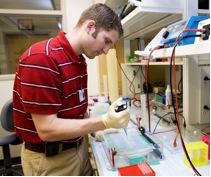

Fellows on the Biomedical Science Investigator Pathway will choose a laboratory and mentor during their first year, after consultation with the division chief.
Take a look at the basic and translational science investigators at Duke Nephrology for all of the opportunities available.
The mentor will generally be one of the basic science faculty members from Duke Nephrology, but with the approval of the division chief, trainees may also choose to work in a laboratory outside of the division. This flexibility allows for trainees to take optimal advantage of the outstanding scientific environment at Duke.
Additional Mentorship
Fellows pursuing the basic science investigator pathway will receive additional mentorship from the Robert J. Lefkowitz Society. This society provides a home for MD and MD/PhD post-graduate trainees who are in the Duke University Department of Medicine Internal Medicine Residency and Fellowship programs and are pursuing careers with a primary focus on basic and translational research as physician-investigators.

Fellow Research Academy (FRA)- This is a longitudinal support program tailored for aspiring researchers.
The FRA comprises four interrelated components:
- Longitudinal grant development workshop: Each fellow works within a curated small group under the guidance of an expert mentor to develop their own career development grant over the course of the year
- Career development guidance: Sessions with DOM researchers cover high-yield content that is customized for fellows in research
- Individual sessions with the DOM Research Development Council: Fellows meet individually with the Research Development Council for research feedback and review of DOM resources
- Networking within DOM: Participation fosters connections across DOM that will enhance fellow prospects for long-term research success.
Office of Physician Scientist Development
Duke’s Office of Physician-Scientist Development (OPSD) was established in 2018 to develop and sustain a vibrant community of physician-scientist researchers at Duke. Trainees in the Hematology/Oncology Trainees are encouraged to participate in the following programs:
This monthly professional development series given by leading researchers at Duke aims to inspire students, trainees and junior faculty to embrace a research career. Seminars provide information and skills required to develop a career in academic medicine.
The OPSD Scholars program provides individual support for trainees and junior faculty who seek career guidance in addition to their clinical and research mentorship. Each OPSD Scholar is paired with a “Master Mentor”, an experienced faculty investigator with substantial experience in research and mentorship. The Master Mentor works one-on-one with each scholar to help devise short-, medium-, and long-term goals and to identify resources both within and external to Duke to help meet those goals. Each mentor/mentee pair is also assigned an OPSD coordinator who organizes meetings, documents mentoring discussions and progress towards goals, and serves as a program liaison and resource for the Scholars during their participation in the program.
Launching in August 2020, the BSRT offers a Master’s level curriculum for trainees interested in pursuing laboratory-based research and provides instruction in skills required to perform rigorous basic science, including: statistic methods for basic science, project and personnel management, scientific communication skills and research funding. Courses use a flipped-classroom design with classroom time dedicated to application of material to specific research problems. Videos will be available online to provide trainees with information and instruction when and as needed.
The OPSD provides direct research funding support for medical students, and research technician support for fellows and junior faculty.
The OPSD hosts an annual half-day symposium that highlights the work of physician-scientist trainees, from medical student through junior faculty.
What is OPSD?

Some of the funded ongoing basic science research projects in the division include:
- The Duke Cardiovascular Research Center funded by the Mandel Center for Hypertension and Atherosclerosis
- The molecular biology of G-protein coupled receptor signaling
- The immunobiology of transplant rejection
- Inflammatory responses in the kidney and their contribution to disease pathogenesis
- The functions of the renin-angiotensin system in regulation of blood pressure and kidney function
- Pathogenesis of familial focal segmental glomerulosclerosis
- Pathogenesis of autoimmune kidney diseases
- FGF23 in CKD
- APOL1 biology
- Stem Cell
- COVID-19
Graduates (since 2014)
David Ortiz- 2014 currently faculty Duke Nephrology
Andrew Malone- 2014- currently faculty Washington University Saint Louis
Paul Phelan- 2014- currently faculty Edinburgh, Scotland
Gentzon Hall- 2015- currently faculty Duke Nephrology
Stacy Johnson- 2016- currently in industry
John Musgrove- 2021- currently faculty Duke Nephrology
Sarah Nystrom- 2023- currently faculty Duke Nephrology
Irma Husain- 2023- currently faculty Duke Nephrology
Susan Murray- 2023- currently faculty Duke Nephrology
Irma Husain- 2023- currently faculty Duke Nephrology
Click here for more information on where our graduates go after fellowship